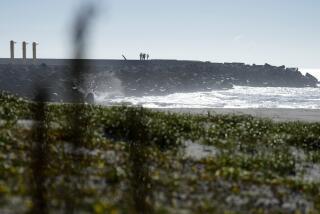Japan to Send Ships to Gulf in Foreign Policy Reversal
- Share via
TOKYO — In a decision marking a fundamental change in Japan’s economics-only foreign policy, Prime Minister Toshiki Kaifu’s Cabinet on Wednesday approved the dispatch of minesweepers to the Persian Gulf.
Six ships of the Maritime Self-Defense Forces, staffed by 510 sailors, will leave Friday, marking the first time since the end of World War II that any Japanese armed forces have been sent overseas for an operational mission.
The move--a direct result of the Gulf War and international criticism of Japan for offering cash but no personnel in support of the allied forces--adds a military element to what Kaifu called the nation’s “contribution to international society.” Previously, all postwar leaders, including Kaifu, had declared that Japan’s international “contributions” would be exclusively non-military.
Article 9 of the constitution, adopted during the 1945-52 American occupation of Japan, declares that “land, sea and air forces, as well as other war potential, will never be maintained.” Successive governments, however, have interpreted the article to permit creation of the Self-Defense Forces, whose operations are confined to the defense of Japan proper.
In a nationally televised news conference, Kaifu said the decision does not represent an “overseas dispatch of troops, which is forbidden by the constitution.”
By kaigai hahei (overseas troop dispatch), Japanese mean a dispatch “for the use of force,” he said.
Coming during peacetime, removal of mines that threaten “the safe navigation of Japanese ships” constitutes a peaceful activity that “will protect daily living in Japan” and contribute to the economic recovery of countries in the Gulf, Kaifu said.
“There is no change in Japan’s pledge to eternally renounce war as a sovereign right and the threat or use of force as a means of settling international disputes,” he added, quoting the first of three sentences in Article 9.
He noted that Japan had made the Article 9 pledge “on the basis of a sincere reflection of history”--a reference to the nation’s aggression that ended with defeat.
Kaifu said the government, in a Cabinet meeting, acted on the basis of a provision in the Self-Defense Forces Law that permits the navy to engage in minesweeping. The provision carries no geographical limitation.
In response to a reporter’s question, Kaifu said the two essential points in the decision--which is expected to serve as a precedent for the future--were that the action was being taken in peacetime and that the security of Japan was involved.
An average of 15 ships pass through the Persian Gulf every day carrying oil to Japan, he noted. From the Gulf region, he added, Japan obtains 70% of its oil.
“We can’t just stand by while other countries act” to clear the mines, Kaifu said.
The prime minister also announced that Japan would raise its contributions to assist Kurdish refugees from Iraq to $100 million, or one-fourth of the total funds that the U.N. Disaster Relief Program requested. The pledge amounted to an increase of $82.5 million above previous commitments, said Sadaaki Numata, a Foreign Ministry spokesman.
Until the Gulf War began, Japan had consistently avoided involvement in overseas military issues.
Decisions Kaifu made last August and January to donate $11 billion to the U.S.-led multinational forces in the Gulf represented Japan’s first-ever postwar overseas military entanglement--and surpassed an entire year’s worth of foreign economic aid. Previously, Japan’s leaders had declared that economic aid would be the main “international contribution” by Japan, the world’s No. 1 aid donor.
Last fall, a bill to authorize the dispatch of troops for noncombat duty to the Middle East died for lack of support in Parliament, where Kaifu’s party lacks a majority in the upper house. In January, Kaifu amended a government ordinance to approve the dispatch of Air Self-Defense Forces C-130 cargo planes to transport refugees in the Middle East, but Japan received no requests for the airplanes, and they were never dispatched.
This time, neither legislation nor amendment of an ordinance is necessary.
Orders were issued Wednesday night for the troops to leave Friday. They are expected to arrive in the Gulf after an 8,000-mile voyage in late May, Numata said.
The squadron of Maritime Self-Defense Forces ships consists of a tender that serves as the command ship, four wooden minesweeper vessels and a support ship.
Numata said the convoy will remain under Japanese command, although it will consult with the other nations now engaged in removing about 1,200 mines that Iraq is reported to have sowed in the Gulf.
Forces from the United States, Britain, France, Germany, Belgium, Saudi Arabia, Italy and the Netherlands were reported to have removed about 60% of the mines. About six months will be needed to remove the remaining mines.
Participation of Germany, which also has constitutional restraints on the use of its military forces overseas, was reported to have encouraged Japan to make the decision.
No indications were available that Japan might start sending its troops abroad unilaterally--although China immediately declared that it feared just such a move. Kaifu, speaking informally outside his office, told reporters that China was “overreacting.”
Foreign Minister Taro Nakayama said Kaifu will make it a point to explain Japan’s peaceful intentions when he visits five Southeast Asian nations beginning Saturday.
The decision, however, is likely to serve as a precedent for Japanese military participation in noncombat roles in international peacekeeping efforts in the future. In his news conference, Kaifu reiterated his determination to draw up a legal framework for contributions of personnel to international peacekeeping and disaster relief--although he refrained from commenting on Self-Defense Forces participation.
The move appeared to enjoy a surprising degree of public support.
In an opinion poll published Wednesday, the newspaper Asahi reported that 56% of the respondents supported dispatch of the minesweepers, while 30% were opposed. A poll by the Fuji-Sankei Communications Group found 77% in support, while a survey by the Public Policy Forum, a private think tank, uncovered 62.6% support.
By comparison, in polls conducted during the Vietnam War, American actions there were opposed by as many as 79% of Japanese.
Except for the minor opposition Democratic Socialist Party, however, all opposition parties condemned the move.
Socialist Chairwoman Takako Doi said the action not only violates the constitution but also represents an “extralegal” decision because Kaifu failed to seek approval of Parliament.
Koshiro Ishida, chairman of the Buddhist-backed Komeito (Clean Government Party), condemned it as a contradiction of the rationale on which the Self-Defense Forces were established--namely, to protect only Japan’s own territory.
JAPAN’S PLEDGE AGAINST WAR
Article 9 of the Japanese Constitution was promulgated Nov. 3, 1946 , and went into effect May 3, 1947. It states:
Aspiring sincerely to an international peace based on justice and order, the Japanese people forever renounce war as a sovereign right of the nation and the threat or use of force as means of settling international disputes.
In order to accomplish the aim of the preceding paragraph, land, sea and air forces, as well as other war potential, will never be maintained. The right of belligerency of the state will not be recognized.
More to Read
Sign up for Essential California
The most important California stories and recommendations in your inbox every morning.
You may occasionally receive promotional content from the Los Angeles Times.













